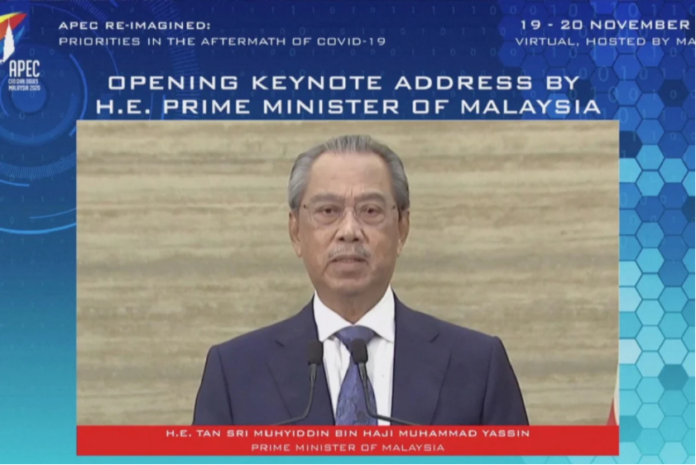Kuala Lumpur, 19 November 2020 – The adaptation of digital economy and continuous innovation have proven to be the need of the time to generate jobs and for businesses to remain relevant amid the unprecedented challenges following the health pandemic, said Tan Sri Muhyiddin Yassin.
The Prime Minister said innovation and digitalisation are fundamentals within this context, as these enablers not only facilitate efforts to reinvigorate economic activities, but also safeguard the health and wellbeing of the people.
He said the COVID-19 pandemic has shown that technology can step-in and sustain communities even when the movement is restricted.
“However, without sufficient infrastructure and close cooperation between the public and private sectors, we run the risk of excluding vulnerable groups due to their lack of access to digital tools.
“Promoting digital inclusion and narrowing the digital divide by increasing investments in ICT (information and communication technology) infrastructure for these groups is therefore, a must,” he said in his keynote address at the virtual APEC CEO Dialogues 2020 today.
Currently, APEC economies comprise approximately 60 per cent of global gross domestic product (GDP), half of the world’s global trade and 40 per cent of the world’s population.
Muhyiddin said continuous innovation is beyond mandatory in the era as it is a pre-requisite for businesses to remain relevant.
Inventive, or at times, cutting-edge adoption and application of digital technologies is the very foundation upon which innovative business models are built and these digital technologies are pivotal in supporting and enhancing the value proposition of businesses and entrepreneurs, he noted.
The Prime Minister also emphasised the priority of inclusive economic growth to ensure that no one is left behind.
“We must continue to adopt economic approaches that place a specific emphasis on women and youth: the backbone of the region’s economy,” he said.
Muhyiddin noted that the youth must also not be left behind, and ensure that the younger generation is equipped with the right skills and knowledge that enable them to contribute effectively to the society.
He said the region must take a moment not only to recognise that free and open trade and investment have indeed resulted in greater prosperity within the Asia-Pacific, but also must underscore the fact that benefits accruing from trade and investment have not permeated across all segments of the society.
“Even today, there is much room for us to improve the narrative of trade and investment with a view to bring tangible benefits to all our people.
“It is in this spirit that we hope to implement the APEC Post-2020 Vision. This vision, which is set to replace the Bogor Goals that reach maturity at the end of this year, will guide the work of APEC for decades to come. It will also contain enablers that drive economic growth and prosperity for the region,” he added.
Muhyiddin said APEC must also reaffirm its support and commitment for the rules-based multilateral trading system that it is essential for businesses, as market stability and predictability are the central pillars which ensure that trade and investment continue to flow, even during times of crisis.
“A well-functioning dispute settlement mechanism at the World Trade Organisation (WTO), which serves as a primary pathway for countries to settle their differences, is also critical in this regard.
“Of similar importance is the need to recommit ourselves to APEC’s core and enduring goal of free and open trade and investment in the region. This is integral to our efforts to rebuild our economies in the aftermath of the pandemic,” he added.
Muhyiddin said as an economic entity, APEC must remain sensitive to the needs of the private sector and continue to cultivate an environment that enhances business confidence.
He noted that APEC assumes a central role in spearheading post-pandemic economic recovery and the region needs to trade and invest its way out of the current economic downturn.
“We must come together and work constructively towards navigating the region along a path of robust, inclusive and sustainable economic recovery and growth,” he added.
Themed “APEC Re-Imagined: Priorities in the Aftermath of COVID-19,” the event was hosted by the APEC Business Advisory Council (ABAC).
-BERNAMA
